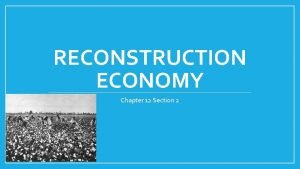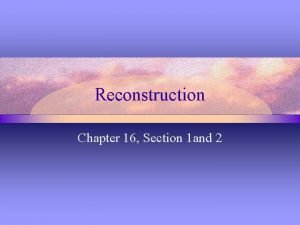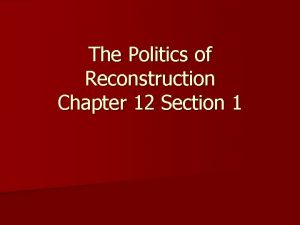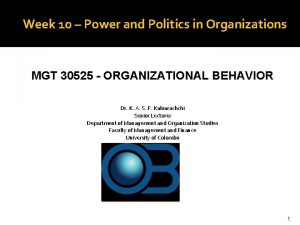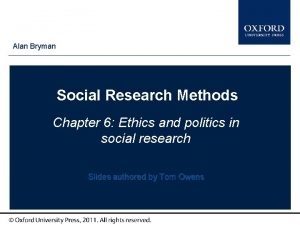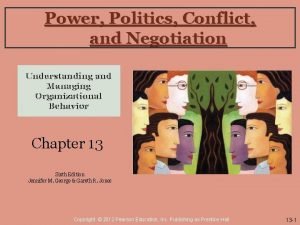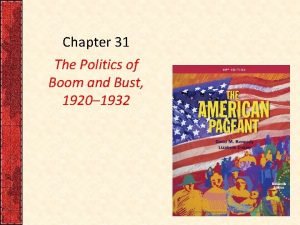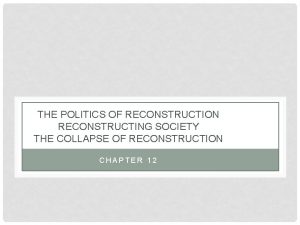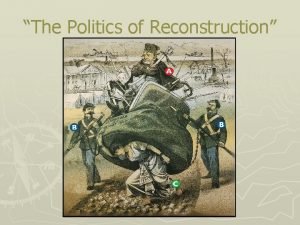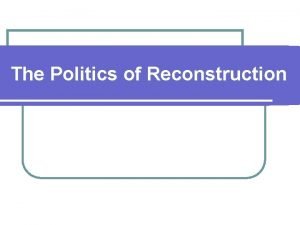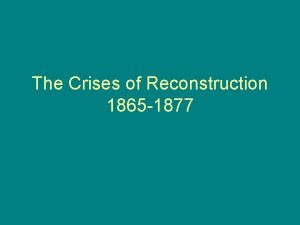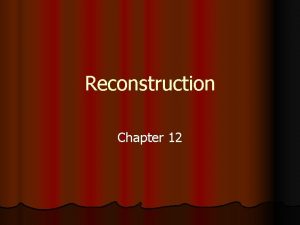Politics of Reconstruction and Reconstructing Society Reconstruction was

















- Slides: 17

Politics of Reconstruction and Reconstructing Society

• Reconstruction was the period of rebuilding after the Civil War. It also refers to the process of bringing the Southern states back into the nation.

Lincoln’s Plan for Reconstruction « 10% Plan * Proclamation of Amnesty and Reconstruction (December 8, 1863) * Pardon Confederates except for high ranking military officials and those accused of crimes against prisoners of war. * A state to be readmitted in the Union as soon as 10% of the state’s voters swore allegiance to the nation. * Four states: Arkansas, Louisiana, Tennessee, and Virginia readmission to the Union.

Wade-Davis Bill (1864) « The bill called for Congress, not the president, to be in charge of Reconstruction. Senator Benjamin Wade (R-OH) « It also declared that a state could be readmitted to the Union when a majority not just Congressman 10% of its voters swore Henry W. Davis allegiance to the Constitution. « Lincoln vetoed the bill (R-MD)

Johnson’s Plan • Lincoln’s assassination in April 1865 left his successor Andrew Johnson to deal with the Reconstruction controversy. • Johnson continues Lincoln’s Policies but he announces his own plan. • The remaining Confederate states could be readmitted to the Union if it would meet several conditions: Each state must withdraw its secession swear allegiance to the Union Annul Confederate war debts Ratify the thirteenth Amendment 1. 2. 3. 4.

th 13 Amendment « Ratified in December, 1865. « Neither slavery nor involuntary servitude, except as punishment for crime whereof the party shall have been duly convicted, shall exist within the United States or any place subject to their jurisdiction. (abolished slavery) « Congress shall have power to enforce this article by appropriate legislation.

Johnson’s Plan • The Radicals were upset with Johnson’s plan. • He failed to address the needs of former slaves in three areas: 1. Land 2. Voting rights 3. Protection under the law • Although Johnson supported abolition; he was not in favor of former slaves gaining the right to vote. • The remaining Confederate states quickly agreed to Johnson’s term. • Some states did not fully comply with the conditions of the plan. Mississippi did not ratify the 13 th amendment.

Freedmen’s Bureau • The Radicals passed a law • It declared that states could creating the Freedmen’s not enact black codes-Laws Bureau. that discriminated against African Americans. • It assisted former slaves and poor whites. • Such as: Prohibiting blacks from carrying weapons • It gave them food and serving on juries testifying clothing and set up against whites marrying hospitals and schools. whites and traveling without • Civil Rights Act of 1866 was a permit. passed.

Freedmen’s Bureau School

th 14 Amendment « Ratified in July, 1868. * Provide a constitutional guarantee of the rights and security of freed people. (gave African-Americans full citizenship and others born in the United States) * Ensured against neo-Confederate political power. * Enshrined the national debt while repudiating that of the Confederacy. « Southern states would be punished for denying the right to vote to black citizens!

President Johnson’s Impeachment « Johnson claims Tenure of Office Act was unconstitutional « Johnson removed cabinet member Edwin Stanton « The House brought 11 charges of impeachment against Johnson. « Johnson’s lawyers disputed these charges by « pointing that Lincoln , not « Johnson , had appointed « Secretary Stanton , so « the act did not apply.

The Senate Trial The lucky holders of tickets like the one below could see Johnson’s Impeachment proceedings in 1868. « 11 week trial. « Johnson acquitted 35 to 19 (one short of required 2/3 s vote).

Ulysses S. Grant Is Elected «Grant won the Presidency by a wide margin in the electoral college but the popular vote was less decisive. Elected to 2 TERMS. «Most of the votes came from Southern African-American. «African-American votes in the South helped Grant win.

th 15 Amendment « Ratified in 1870. « The right of citizens of the United States to vote shall not be denied by the United States because of race, color, or previous condition of servitude. « The Congress shall have power to enforce this article by appropriate legislation. « Women’s rights groups were furious that they were not granted the vote!

Politics in the Postwar South « Difficulty facing the new Republican government was the different groups within the Republican Party in the South. « “Scalawags” were white southerners farmers who did not want wealthy planters to regain power. « “Carpetbaggers” were northerners who moved to the south after the war. « African Americans were eager to vote and take part in politics. « The differences between the three led to lack of unity in the party.

Former Slaves Face Many Challenges • • • African Americans faced decisions without land jobs tools money and with few skills Reunification of Families Slavery had split many African American families apart. Once free they took advantage of looking for loved ones. Once reunited they married and raised their children without the fear of being separated. Churches & Volunteer Groups They founded their own churches (Methodist & Baptist) Ministers often became important community leaders They also formed volunteer organizations. That provided financial and emotional support for their members. • • Education Thousands of African Americans of all ages sought an education. • Groups organized schools colleges and universities. They raised money to buy land to pay teacher’s salaries. • Some white southerners outraged by the idea of educated African Americans responded with violence. • Despite threat of violence freed people were determined to learn. Segregation- African Americans denied many rights and opportunities

Many whites frustrated by their loss of political power and by the South’s economic stagnation; took out their anger on African American. Certain groups embarked on a campaign to terrorize African American into giving up their political rights and their efforts at economic improvement. The opposition to Reconstruction begins…
 Chapter 12 section 2 reconstructing society
Chapter 12 section 2 reconstructing society Chapter 12 section 2 reconstructing society
Chapter 12 section 2 reconstructing society Chapter 12 section 1 the politics of reconstruction
Chapter 12 section 1 the politics of reconstruction Reconstruction and its effects chapter 4 section 4
Reconstruction and its effects chapter 4 section 4 Gertler econ
Gertler econ Power and politics in organizations
Power and politics in organizations Example of opportunities in media and information
Example of opportunities in media and information Lesson 5 african american culture and politics
Lesson 5 african american culture and politics Bureaucracy and politics in india
Bureaucracy and politics in india Power, politics and conflict in organizations
Power, politics and conflict in organizations Ethics and politics in social research bryman
Ethics and politics in social research bryman Conflict power and politics
Conflict power and politics Philosophy, politics and economics michael munger
Philosophy, politics and economics michael munger Lesson 1 - politics and the gilded age
Lesson 1 - politics and the gilded age Chapter 31 the politics of boom and bust
Chapter 31 the politics of boom and bust Chapter 20 whose government
Chapter 20 whose government Politics and international relations bsc
Politics and international relations bsc Ap gov unit 1 study guide
Ap gov unit 1 study guide
